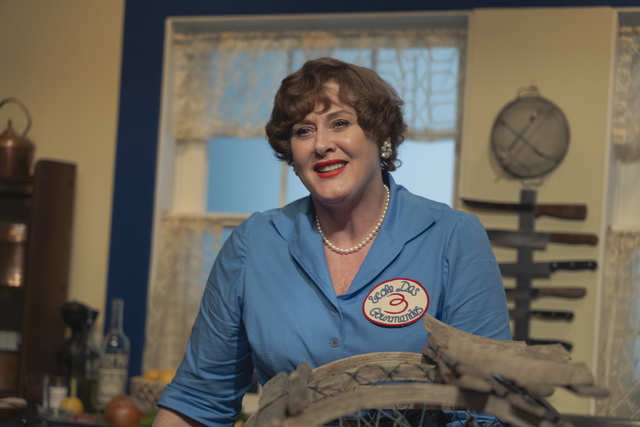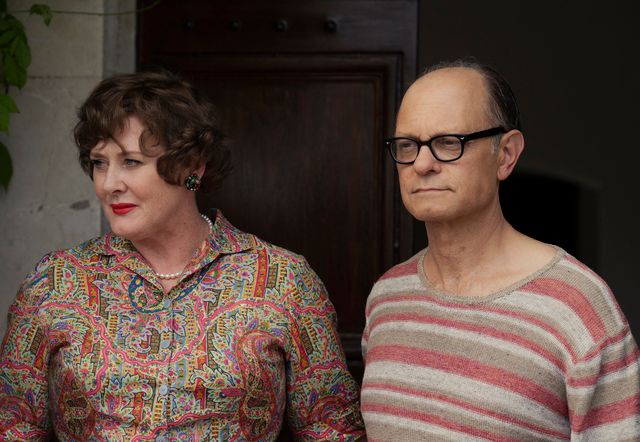
I miss dinner parties. I miss the luxury of sitting around a candlelit table sharing a bottle of wine and a conversation that winds and lulls around the food, around bites of crusty baguette smeared with fig jam and baked brie, mouthfuls of crisp green lettuce coated with a tangy, homemade vinaigrette, twisted forkfuls of pasta coated with a light marinara, freshly grated Parmesan, and specks of green basil.
Instead of this type of long, decadent dinner that is enjoyed with other adults, my husband and I eat almost exclusively with our 5-year-old and 3-year-old. We devour our food while standing up or swallowing so quickly that it’s hard to taste any of the flavor, trying to finish our meal before one of the kids melts from exhaustion. Our only goal is reduced to getting through the nightly parenting to-do list of eating, bath, books and bed.
It was last winter after checking off that list and collapsing on the couch that my husband and I first found Max’s “Julia.” Despite its 96% rating on Rotten Tomatoes, the show didn’t seem to get a lot of press. And we were even more surprised that we had never heard of it when we realized that most of Season 1’s episodes had already been released because, after the first episode, we were hooked. The fictionalized story of Julia Child starting her show “The French Chef” and becoming The Julia Child became an immersive treat, each episode a taste of those long-forgotten dinner parties that we never wanted to end.
The first season opens in 1961 with Julia (Sarah Lancashire) and her husband Paul (David Hyde Pierce) living in Oslo, Norway. Paul is refreshing the wine. Julia is standing over a sizzling piece of fish. The lighting is dim, the candles are lit, and their house is full of guests celebrating a letter from Judith Jones (Fiona Glascott), an editor at Knopf, that says the publishing house wants to release “Mastering the Art of French Cooking” — a cookbook that Julia co-wrote with Louisette Bertholle and Simone Beck (Isabella Rossellini), also known as Simca. While Julia’s reading the letter aloud, the phone rings. Paul, a diplomat, is being called back to Washington, where he thinks he will be promoted but is forced to quit and take an early retirement.
This irony — Julia’s career beginning as Paul’s is ending — is the tension that underpins the first season, and becomes even more evident when the show’s pilot jumps forward one year to Julia and Paul living in Cambridge, Massachusetts. Julia is making breakfast in their robin’s-egg blue and daffodil yellow kitchen before leaving for her first TV appearance, an interview on local station WGBH’s show “I’ve Been Reading.” She sits down for the interview with a Mary Poppins-style bag of ingredients that she ungracefully unloads onto the set. To everyone’s confusion, she crawls around the stage to plug in a hot plate. As she makes an omelet while perched over a low coffee table, a star is born, even if no one except Julia and associate producer Alice Naman (Brittany Bradford) can see it.
The spark of energy that Julia experiences on camera is sharply contrasted with the deflation she feels a few scenes later at a doctor’s appointment, when she finds out that she is going through menopause. With tears running down her cheeks, it is clear that Julia grieves the cultural weight of her change, the implication that she is past her prime. But she rejects it. Instead, she becomes determined to make a cooking show.
“There was something about being in front of a camera like that that just felt right. It was as if I came into focus,” Julia tells best friend Avis DeVoto (Bebe Neuwirth) as they plot through the “Paul pickle” — the question of how to convince him to support her making a pilot episode for WGBH.
A few scenes later she makes an even bolder statement, telling Judith: “At this state of my life, I don’t want to feel invisible. I want to feel relevant.” This is when the realities of the 1960s and gender roles and marital expectations and ageism bind together to give Julia something to strive against and to fight for.

Her goal undergirds the show but does not dominate it. And the beauty of “Julia” is this complexity — its ability to be a show about its culturally influential titular character but also a show about how her story affects and is simultaneously shaped by the experiences of the characters around her: her husband, her best friend, her assistant producer, her director, her boss, her editor, her viewers. Like a good dinner party conversation, the show is only made better by these contrasting viewpoints.
In a modern world driven by an internet that normalizes and encourages snap judgments and moral indictments, it is refreshing to see imperfect characters shown with nuance, and the show’s second season plays to this strength.
While the first season is about striving for visibility, the second is about the impact of it, of navigating success. The season opens a few months after the Season 1 finale. Julia and Paul are in France visiting Simca and her husband. Supposedly, the intention of their visit is to work on the next volume of their cookbook, but it’s really to escape the spotlight of Julia’s success, to take a break, to recharge and, most importantly, to eat.
The food, sets, costumes and dialogue are delightful. There’s the same joy in each episode, but there is also space for more complexity — for Julia, her friends and the quickly evolving social movements of the time. This room for nuance, especially as it relates to gender and race, again provides viewers with a frequent reminder not to make snap judgments, to step back and see that “progress” looks different for everyone, feels different for everyone, and is complicated for everyone.
Julia’s world is grayer than our world is allowed to be, and I, personally, love that. Instead of feeling didactic, the show offers characters — most importantly Julia — the ability to be real and imperfect and to learn from mistakes, only to repeat those mistakes again. And this happens alongside a backdrop of dreamy dinner parties and competitive food challenges and intimate dinners at Julia’s kitchen table.
It’s the show’s ability to do so much while having so much fun that makes its recent cancellation devastating. Halfway through this season, a side character tells Julia: “Your show, well, it makes me happy. I cook with you every Sunday night, and after a long and often challenging week, that is something.”
We need more shows like “The French Chef,” like “Julia,” more television that makes us happy without mitigating — or obscuring — life’s complexity, especially when so much of modern life can feel grim and “challenging.”
At the beginning of the second season Julia is frustrated because she can’t replicate the “ethereal” pastry-encrusted fish she tasted at Monsieur Bocuse’s restaurant. Her mentor at Le Cordon Bleu tells her not to worry because by the third attempt, “we will have divined the magic.”
That’s how I feel about the lost third season of “Julia.” It had the potential to be magic, a culmination of the ingredients that made the first and second seasons so delightful with the practice and time needed to make the recipe even better, to produce a bite of food so good that it gives life more flavor and more meaning.
I wish “Julia” had the chance to throw another dinner party, one with a great atmosphere, even better food, and perspective-shifting conversation.
Disclaimer: The copyright of this article belongs to the original author. Reposting this article is solely for the purpose of information dissemination and does not constitute any investment advice. If there is any infringement, please contact us immediately. We will make corrections or deletions as necessary. Thank you.
